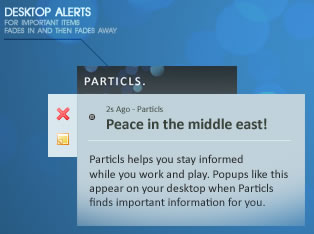 Information overload is a buzz phrase which has been getting a lot of use recently. It refers to the enormous amount of information which we now consume (largely because of the level of accessibility to content which the Internet gives us), and the challenges that that creates. Another important issue is the Long Tail, as recognised by Chris Anderson, and the way that relates to content. In other words, there is now far more information available which makes discoverability much harder.
Information overload is a buzz phrase which has been getting a lot of use recently. It refers to the enormous amount of information which we now consume (largely because of the level of accessibility to content which the Internet gives us), and the challenges that that creates. Another important issue is the Long Tail, as recognised by Chris Anderson, and the way that relates to content. In other words, there is now far more information available which makes discoverability much harder.
Advertising
Attention: A Cure For Information Overload?
IPTV Growth To Boost Video Market To $277Bn By 2010: iSupply
 Research house iSupply are predicting that IPTV will be boosting the reveneue generated by the premium video services market from its current level of less than $200Bn to a whopping $277Bn by 2010.
Research house iSupply are predicting that IPTV will be boosting the reveneue generated by the premium video services market from its current level of less than $200Bn to a whopping $277Bn by 2010.Their definition of the premium video services market takes in pay-TV, mobile video, DVD, broadband video and theatre/box office receipts, but when advertising revenues are added, the total market reaches a stunning $370Bn.
iSupply see IPTV growing at frankly amazing rates. In 2005 they saw IPTV worth $681m and, with their estimate of a Compound Annual Growth Rate (CAGR) of 103 percent (!), see it reaching a calculator-busting £23.5Bn in 2010.
It appears that they see the public’s willingness to pay for content expanding significantly. Strange, but we and our other tech-aware pals are finding ourselves just not watching that much mainstream content – even if it is available on-demand.
 That aside, iSupply see the battle royal between two big, hairy beasts – the current pay-TV world of direct-to-home satellite and digital and analogue cable TV services – and the telcos who will be pushing quad-play.
That aside, iSupply see the battle royal between two big, hairy beasts – the current pay-TV world of direct-to-home satellite and digital and analogue cable TV services – and the telcos who will be pushing quad-play.On the physical format side, iSupply point out that DVD sales are slowing, and will continue to do so, with the decline over the next 3-4 years being as much as 15 percent to 20 percent.
One very interesting point that is raised by them is
With most movie libraries and television series already on DVD, Hollywood studios are generating more than half of their revenues from DVDs—and are running out of new content to sell, making this an issue of paramount importance to them. One cause of the DVD sales deceleration is the fact that consumers have become more price-sensitive, believing that the average DVD cost of $20 is too expensive, especially compared to renting.
It’s not clear where this leaves Blu-Ray and HD-DVD – both on the price of the media (which is expected to be higher than DVD) and on the material that is available. Given Hollywood’s slow ability to make new material, and that most of it will have been sold on DVD already – it’s not clear if the new formats will help them.
Wikipedia To Run Out Of Money?
Last week at the LIFT07 conference in Geneva, Florence Devouard, chairwoman of Wikimedia, the organisation behind the ubiquitous, editable-by-all online encyclopedia warned that Wikipedia was facing a serious financial crisis if it did not receive more funding soon.
 Whilst there have been sensationalist reports that Wikipedia would be forced to close in three to four months if the current financial situation continued, this has shown not to be the case by an interview of Devouard. She does stress, however, that Wikipedia cannot continue growing at the current pace if it does not find ways to raise money.
Whilst there have been sensationalist reports that Wikipedia would be forced to close in three to four months if the current financial situation continued, this has shown not to be the case by an interview of Devouard. She does stress, however, that Wikipedia cannot continue growing at the current pace if it does not find ways to raise money.Currently Wikimedia (which is a non-profit organisation) is funded almost entirely from donations, with the occasional content license deal. There can be little doubt that if Wikipedia were to run advertising, it could instantly become self sufficient, as Jason Calacanis, web media entrepreneur, has been advocating. They point to the success of the Mozilla Foundation (the makers of Firefox), another non-profit organisation, who are in a very good financial position thanks to an advertising deal with Google.
However, Wikimedia has not been keen to accept such advertising, in part due to the fear that it would taint the non-commercial nature of Wikipedia, and in part due to opposition from some users.
It would seem that Wikimedia has two options for the future of its funding; continue with the current approach of soliciting donations as the main source of income or accept advertising, with all the negative consequences that may follow.
There may, however, be a third way. I would like to see Wikipedia commercialised; there can be little doubt that it would be of enormous commercial value to a purchaser, and that its status as a revenue generating business would help to guarantee its future. Wikipedia’s objectivity as an organisation is sacrosanct, but so are Google’s search results. Google recognised when it was founded that it would cease to be of any value to its users the day that it accepted money for placement within its search results. The result is clearly labeled advertising which in no way detracts from a useful product, and an emphatically revenue positive company.
I see no reason why Wikipedia cannot experience the same kind of success that Google has enjoyed; a rich Wikipedia could afford to pay experts to review its articles, improving style and accuracy (and thereby removing a major concern which is a barrier to its mass adoption as a trusted source of information). A rich Wikipedia would ensure that this resource which has become crucial to our information age will remain for as long as it is needed.
Don’t forget that you can support Wikipedia by sending donations to support Wikipedia. (Thanks Mikker)
Huw Leslie is editor of UK-based Web 2.0 and software blog Gizbuzz, and the co-founder of technology blog network Oratos Media. His personal blog is For Crying Out Loud!Whoops! PC Users Can’t View UK GetAMac Videos
 So I’m being bombarded by Apple’s super-expensive advert campaign telling me how great Macs are and how only dull business nerds bother with PCs.
So I’m being bombarded by Apple’s super-expensive advert campaign telling me how great Macs are and how only dull business nerds bother with PCs.The adverts feature the smug comedy duo David Mitchell and Robert Webb. And they’re on the tele. They’re on billboards. They’re everywhere.
And when I pop over to my MySpace homepage, what’s that blaring out (with the audio set to ‘on’ by default?).
Yep, it’s another chuffing advert featuring the same two comedians, happily selling their arses for a slice of Apple’s fat budget while insisting that I’m deeply mistaken in my choice of computer.
The two comics – who are quickly transforming from entertaining to kill-them-in-the-face irritating in my book – pair up for a Mr Mac and Mr PC routine, designed to make users want to rush out and put money in Jobs’s already expansive coffers.
The set of six adverts insist that PCs users are doomed to suffer an onslaught of unstoppable viruses, security leaks and endless crashes.
 PC users are represented as dull business bores who wouldn’t know what fun is if it French-kissed them in the buttocks, while Mac users are seen to be spontaneous, fun-loving bon viveurs, hurtling along the highway of creativity at reckless speeds.
PC users are represented as dull business bores who wouldn’t know what fun is if it French-kissed them in the buttocks, while Mac users are seen to be spontaneous, fun-loving bon viveurs, hurtling along the highway of creativity at reckless speeds.So I give in. I decide to take a look at the videos on Apple’s site, and click on the link using my virus-free, non-crashing, safe and relatively fun PC and get ready to learn, “Why I’ll love a Mac.”
And then, oh dear. Firefox brings up an error message. From the one, solitary piece of Apple software on my machine; Quick Time.
Still, no problem. After all, I’m trying to look at an Apple site with Apple software and their site proudly boasts that their products “just work,” so I’m sure we’ll be over this little glitch in moments.
“Quick Time is missing software to perform this operation…” says the pop up window as only the audio plays in the background.
 “Fair enough,” I think to myself, confident of a slick, smooth, user-friendly solution coming along.
“Fair enough,” I think to myself, confident of a slick, smooth, user-friendly solution coming along.And then comes the killer blow with the final line of the error message: “Unfortunately, it is not available on the QuickTime server.”
And that’s it. No help offered, no options, just a simple, ‘It doesn’t work, it won’t work and we’re not going to tell you how to make it work. So bugger off’
Thanks Apple.
But I’m a determined soul, so I decide to fire up Internet Explorer 7 instead.
As soon as I arrive at Apple’s page it wants to run an Active X control and for me to download QuickTime.
Hmmm. Not very user friendly. Why should I have to go through all the palaver of downloading software just to view an advert I can view just fine on other sites?
But – hey! – I want to be the cool guy instead of the nerdy PC user, so I download the software and get ready to be entertained and persuaded.
Except I’m left with the same blank, audio-only video which ends with a message from Apple asking me, “how much time have I spent troubleshooting your PC?”
I don’t think my answer to that is printable.
*Postscript: we asked several PC-owning friends to look at the Apple page and they had mixed fortunes. Some had no problems viewing the videos, while others suffered the same blank screen/error message combo as me.
Of course, Mac-huggers could argue that this proves how useless PCs are, but the fact that the videos played back perfectly before QuickTime shoved in its oar sure doesn’t speak a persuasive word to my ears.
Giant Graphic For Australian Google Maps
A few bods in Australia got together after hearing that the Google Maps satellite which it takes images from was going to be passing over Sydney.
Their mission? To create a giant graphic, so it would be picked up and be viewable on Google Maps.
It’s not the first time anyone has thought of the idea of course (we’ve all done this at Digital-Lifestyles towers), but these characters actually got off their behinds and did it.
 They started at 4am, pegging 2,500 sheets of paper in the grass of a park to form a giant eye – the pun being that Australia was also watching the world.
They started at 4am, pegging 2,500 sheets of paper in the grass of a park to form a giant eye – the pun being that Australia was also watching the world.It appeared on the tech discussion board Slashdot, and subsequently was hit with a ton of comments accusing them of “spamming Google Maps.” You’ll know that we hate spam (natch), but we fail to see why some of the commenters are getting so irate.
As one of the comments pointed out, they don’t really have to wait for the map to appear on Google Maps – they’ve gained loads of it from the stunt alone.
Read more on their posting about it.
Getamac: Apple Launches UK Switch Campaign
The UK equivalent of the Apple US Switch campaign was launched today in the UK. Featuring Mitchell & Webb, well known and highly-respected UK comics, they maintain the signature people-standing-in-front–of-a-white-backgrounds look of other Apple campaigns.
The casting is perfect, with the PC played by David Mitchell and Robert Webb being the Mac – the business/casual roles they played in the genius TV venture, Peep Show.
 Apple must be spending large on this as it’s all over the UK MySpace pages, with double ads showing on a lot of the pages.
Apple must be spending large on this as it’s all over the UK MySpace pages, with double ads showing on a lot of the pages.Clearly riding on the shirt-tails of the world’s obsession with iPods, through this campaign Apple, are attempting to persuade iPod-owners that their computing lives could be just as beautiful as their music lives. By the look of the last Quarter’s figures from Apple, where they sold just over a million Macs and over 21 million iPods, it’s not a bad idea to increase your computer sales.
There’s three campaigns in the wild at the moment, Restart; Virus and Office, are all worth a watch. Luckily someone (just perhaps, just perhaps, the advertising company!) has put the adverts up on YouTube – a pretty neat trick for something that hasn’t been on TV yet.
Restart plays on the fact that PCs freeze and often crash during use, while Macs don’t suffer this to the same degree – although it’s not unknown.
Virus takes great delight in the 140k new viruses that were created for PCs last year, while the number of Mac viruses remains minimal – something that might change if lots more people starts buying Macs.
Office encourages people to detach their home PCs from being associated from the work PC, which is normally a PC – what this will do to people who have Macs at work is yet to be established.
Quite what Mitchell thinks of being cast as the dorky PC is unknown, but we suspect he’ll be mopping up his tears with his bulging appearance fee cheque.
BTW – Our fave Apple advert remains the Home Movie.
MPU Expanding Ads Grow Up
 We spent a fair bit of time watching online advertising, as the income for Digital-Lifestyles comes in solely from it.
We spent a fair bit of time watching online advertising, as the income for Digital-Lifestyles comes in solely from it.While we were researching the story about Engadget’s Dafur Gears of Peace auction, we noticed an advert on the right of the page by Best Buy, a major US electronics retailer.
It’s a format called MPU, which has, over the last year or so, become a favorite with adversities and publishers. The reason Message Plus Unit (MPU) is popular is its small size (250 x 250) lets it be placed within articles, heightening the hope that the reader of the site will pay some attention to the advert.
What Best Buy have done with the limited 250 x 250 size is the interesting part. We’re not focusing on the design, although it must be effective, or we wouldn’t have paid attention to it in the first place.

The reader is encouraged to place their mouse over the MPU. When it’s kept still there for 2-3 seconds, the graphic changes completely, expanding an additional 200 pixels to the left-hand side.
This is where it gets smart. The reader is able to select items from a list of six (you know the sort of thing, Nintendo DS Lite, LCD TV, etc) and drag and drop them to a dream xmas list.
Once the oh-I-really-want-one-of-those items has been selected, there’s a field to the email address of the person that is going to be mugged into buying them. Who it’s from and a suitable begging note can also be entered.
We love the theory of this – getting people to directly interact with an advert without having to go to another site and then spreading it to others too. The reality is that we couldn’t get the process to complete. Selecting items was easy enough, but we found the ad reset itself a number of times, losing all of the details in the meantime. If we hadn’t been looking at it for this article, we certainly wouldn’t have bothered re-entering the details.
It would be really interesting to find out how Engadget are being reimbursed for this. It must be above the standard rate of an MPU, the fact that it’s active will boost this alone. We suspect that Engadget must have sorted out a better deal, that will probably be related to the reader making an action, or even on the potential value of the purchases that might fall out of the end of this.
Google: Mobile Phones Should Be Free
 Google chief executive, Eric Schmidt, has chatted to Reuters about his thoughts on mobile phones, and how their ownership and usage should be free, supported of course by advertising. In his words “It just makes sense that subsidies should increase” as advertising rises on mobile phones.
Google chief executive, Eric Schmidt, has chatted to Reuters about his thoughts on mobile phones, and how their ownership and usage should be free, supported of course by advertising. In his words “It just makes sense that subsidies should increase” as advertising rises on mobile phones.He also told Reuters
Google is experimenting with delivering text, brand-image and video ads onto small-screen mobile phones. It is enjoying early success in its strategy to win phone network allies in Japan, where TV viewing and shopping on phones is advanced.
This follows the release of their second application designed specifically for mobile devices, available outside the US as well.
While hypothesising about the possible, Schmidt brought in a little reality by adding that he wasn’t aware of any effort by partners such as phone makers Nokia or Motorola or mobile operators like Vodafone to make such a radical move.
Google is finding it harder to disguise that their search business is just a ruse – they are, as we’ve said for a long time, an advertising company.
They’ve already announced solid plans to move their advertising to printed newspapers, and with this recent comment, making it clear that they’ll be moving the advertising to mobile phones as well.
Google To Trial Print-Based AdWords Service
 Google is set to announce a new advertising partnership with over 50 American newspapers, in an initiative designed to create an online marketplace to help Ye Olde Printe Media sell advertising electronically.
Google is set to announce a new advertising partnership with over 50 American newspapers, in an initiative designed to create an online marketplace to help Ye Olde Printe Media sell advertising electronically.Big newspapers like The New York Times, the Chicago Tribune and The Washington Post are already onboard for the trial, with Google planning to expand the service internationally.
Under the scheme, Google will offer some of its AdWords customers the opportunity to advertise in print newspapers in much the same way as they buy advertising on the web.
Newspapers signed up to the scheme enter demographic details about their titles and give example advertising rates, while advertisers list how much they’re prepared to pay for classified space in specified titles.
Publishers then decide whether to accept the offers.
 Launching as an early “alpha” trial, Google has said that it won’t initially charge for hosting the service, but expects to levy a ‘relatively modest commission’ if it takes off.
Launching as an early “alpha” trial, Google has said that it won’t initially charge for hosting the service, but expects to levy a ‘relatively modest commission’ if it takes off.Runaway success
Google online AdWords campaign has been so successful that they’ve been able to keep up with the demand from advertisers, with Tom Phillips, Google’s director of print advertising, commenting about the print service: “This is money that our advertisers would spend with us if we had the online inventory for them to spend it on.”Philips added that Google wanted to help the newspaper business, but was still chasing the dollar, “We are not just doing this to be friends with print media. We are doing this because there is a big business opportunity here providing value to media properties,” he added.
 Google’s turbo-charged revenue increases (up 70 per cent in the third quarter) continue to give traditional media outlets the heebie-jeebies, as advertising revenues continue to crash in tabloid and regional titles across the UK.
Google’s turbo-charged revenue increases (up 70 per cent in the third quarter) continue to give traditional media outlets the heebie-jeebies, as advertising revenues continue to crash in tabloid and regional titles across the UK.Last week, research revealed that Google is now coining in more cash from advertising than Channel 4 in Britain, with the Internet Advertising Bureau saying that online ad spending in the UK had soared 40% in the first half of 2006 compared with the same time period last year.
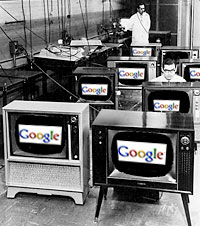 The company is set to unveil deals today with satellite TV service EchoStar Communications and Astound Cable in the US to broker commercials in a similar way to how it offers online advertising.
The company is set to unveil deals today with satellite TV service EchoStar Communications and Astound Cable in the US to broker commercials in a similar way to how it offers online advertising.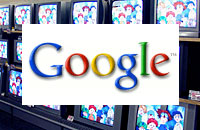 During the television pilot, Google will serve commercials to EchoStar’s Dish Network satellite channels, a US service which enjoys around 13.1 million subscribers. The adverts won’t look any different to regular ones, carrying no Google branding and appearing in the usual time slots.
During the television pilot, Google will serve commercials to EchoStar’s Dish Network satellite channels, a US service which enjoys around 13.1 million subscribers. The adverts won’t look any different to regular ones, carrying no Google branding and appearing in the usual time slots. Research house iSupply are predicting that IPTV will be boosting the reveneue generated by the premium video services market from its current level of less than $200Bn to a whopping $277Bn by 2010.
Research house iSupply are predicting that IPTV will be boosting the reveneue generated by the premium video services market from its current level of less than $200Bn to a whopping $277Bn by 2010. That aside, iSupply see the battle royal between two big, hairy beasts – the current pay-TV world of direct-to-home satellite and digital and analogue cable TV services – and the telcos who will be pushing quad-play.
That aside, iSupply see the battle royal between two big, hairy beasts – the current pay-TV world of direct-to-home satellite and digital and analogue cable TV services – and the telcos who will be pushing quad-play.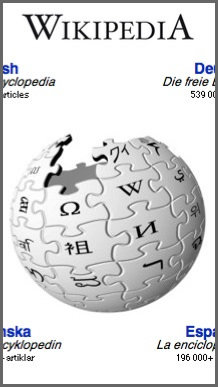 Whilst there have been sensationalist reports that Wikipedia would be forced to close in three to four months if the current financial situation continued, this has shown not to be the case by
Whilst there have been sensationalist reports that Wikipedia would be forced to close in three to four months if the current financial situation continued, this has shown not to be the case by  So I’m being bombarded by Apple’s super-expensive advert campaign telling me how great Macs are and how only dull business nerds bother with PCs.
So I’m being bombarded by Apple’s super-expensive advert campaign telling me how great Macs are and how only dull business nerds bother with PCs.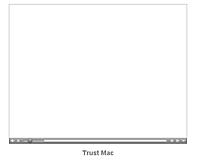 PC users are represented as dull business bores who wouldn’t know what fun is if it French-kissed them in the buttocks, while Mac users are seen to be spontaneous, fun-loving bon viveurs, hurtling along the highway of creativity at reckless speeds.
PC users are represented as dull business bores who wouldn’t know what fun is if it French-kissed them in the buttocks, while Mac users are seen to be spontaneous, fun-loving bon viveurs, hurtling along the highway of creativity at reckless speeds.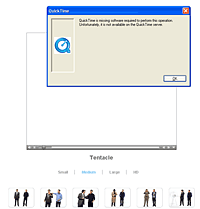 “Fair enough,” I think to myself, confident of a slick, smooth, user-friendly solution coming along.
“Fair enough,” I think to myself, confident of a slick, smooth, user-friendly solution coming along. They started at 4am, pegging 2,500 sheets of paper in the grass of a park to form a giant eye – the pun being that Australia was also watching the world.
They started at 4am, pegging 2,500 sheets of paper in the grass of a park to form a giant eye – the pun being that Australia was also watching the world.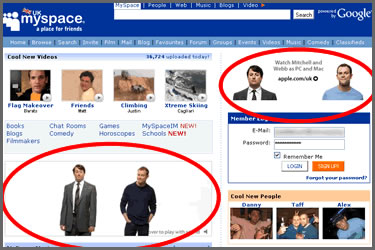 Apple must be spending large on this as it’s all over the UK MySpace pages, with double ads showing on a lot of the pages.
Apple must be spending large on this as it’s all over the UK MySpace pages, with double ads showing on a lot of the pages. We spent a fair bit of time watching online advertising, as the income for Digital-Lifestyles comes in solely from it.
We spent a fair bit of time watching online advertising, as the income for Digital-Lifestyles comes in solely from it.
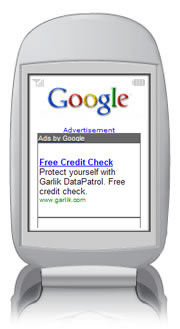 Google chief executive, Eric Schmidt, has chatted to Reuters about his thoughts on mobile phones, and how their ownership and usage should be free, supported of course by advertising. In his words “It just makes sense that subsidies should increase” as advertising rises on mobile phones.
Google chief executive, Eric Schmidt, has chatted to Reuters about his thoughts on mobile phones, and how their ownership and usage should be free, supported of course by advertising. In his words “It just makes sense that subsidies should increase” as advertising rises on mobile phones.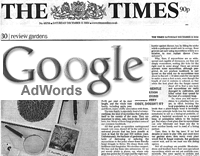 Google is set to announce a new advertising partnership with over 50 American newspapers, in an initiative designed to create an online marketplace to help Ye Olde Printe Media sell advertising electronically.
Google is set to announce a new advertising partnership with over 50 American newspapers, in an initiative designed to create an online marketplace to help Ye Olde Printe Media sell advertising electronically.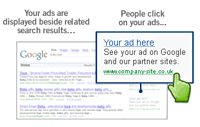 Launching as an early “alpha” trial, Google has said that it won’t initially charge for hosting the service, but expects to levy a ‘relatively modest commission’ if it takes off.
Launching as an early “alpha” trial, Google has said that it won’t initially charge for hosting the service, but expects to levy a ‘relatively modest commission’ if it takes off. Google’s turbo-charged revenue increases (up 70 per cent in the third quarter) continue to give traditional media outlets the heebie-jeebies, as advertising revenues continue to crash in tabloid and regional titles across the UK.
Google’s turbo-charged revenue increases (up 70 per cent in the third quarter) continue to give traditional media outlets the heebie-jeebies, as advertising revenues continue to crash in tabloid and regional titles across the UK.